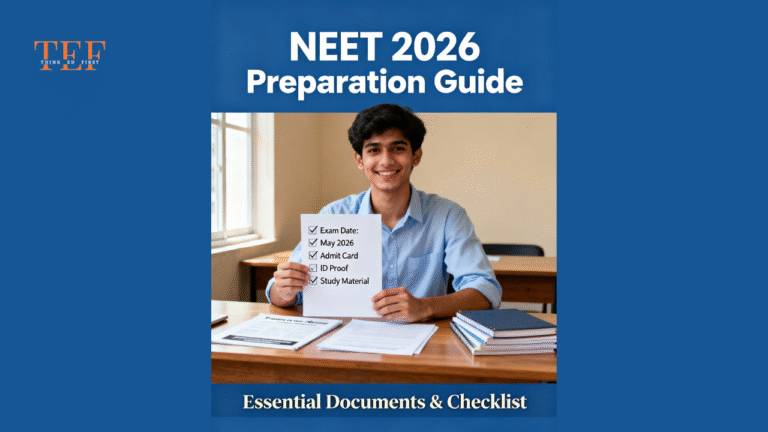Did you know that over 20 lakh students appear for the NEET exam each year, but only a fraction secure top ranks? One of the most critical factors in achieving success is choosing the right subject sequence. A strategic approach can make all the difference in maximizing your score and managing time effectively.
We understand the pressure students face during this high-stakes exam. That’s why we emphasize the importance of planning your attempt wisely. By focusing on the subject that aligns with your strengths, you can build confidence and set the tone for the rest of the test.
Our expert insights, combined with official guidelines, will help you make informed decisions. Whether it’s tackling Biology first or prioritizing Chemistry, a well-thought-out strategy can optimize your performance. Let’s dive into the details and explore how to approach this challenge effectively.
Key Takeaways
- Choosing the right subject sequence can significantly impact your NEET exam performance.
- Starting with your strongest subject builds confidence and saves time.
- Official guidelines provide valuable insights into exam patterns and strategies.
- Effective time management is crucial for answering all questions within the allotted time.
- A strategic approach helps reduce stress and improves overall accuracy.
Strategic Overview of the NEET Exam
The NEET exam is a pivotal step for aspiring medical professionals in India, shaping their future careers. Understanding its structure and requirements is essential for effective preparation. Let’s explore the key aspects of the exam pattern and eligibility criteria to help you plan better.
Understanding NEET Exam Pattern 2024
The NEET exam pattern for 2024 consists of 200 questions divided into two sections: Section A and Section B. Section A includes 35 mandatory questions, while Section B offers 15 questions, of which candidates must answer 10. This structure ensures a balanced assessment of knowledge across Physics, Chemistry, and Biology.
Each correct answer awards 4 marks, while an incorrect one deducts 1 mark. Understanding this marking scheme is crucial for avoiding negative scores. Time management plays a significant role, as candidates have 3 hours to complete the test.
Eligibility and Attempt Limit Considerations
To appear for the NEET exam, candidates must meet specific eligibility criteria. The minimum age requirement is 17 years, or candidates must turn 17 by December 31 of the admission year. This ensures that students are adequately prepared for the challenges of medical education.
Recent updates have removed restrictions on the number of attempts, allowing candidates to take the exam as many times as needed. This change provides greater flexibility and reduces unnecessary pressure on aspirants.
- The exam pattern includes 200 questions divided into two sections.
- Section A has 35 mandatory questions, while Section B offers 15 optional questions.
- Each correct answer awards 4 marks, with a deduction of 1 mark for incorrect responses.
- Candidates must be at least 17 years old by December 31 of the admission year.
- There is no limit on the number of attempts, offering greater flexibility.
Our Approach to neet subject attempt order
Crafting a smart plan for tackling the NEET exam can significantly boost your performance. We believe that the order in which you approach the subjects plays a crucial role in maximizing your score. Our tailored method ensures that candidates can focus on their strengths while managing time effectively.
One common challenge is deciding where to start. A detailed analysis of your preparation helps identify the subject that aligns with your skills. This not only builds confidence but also sets a positive tone for the rest of the exam.
Our approach is based on in-depth data from previous exam reports. By reviewing patterns and trends, we provide insights that help candidates make informed decisions. This method ensures a logical and efficient strategy for tackling the exam.
Here’s how our approach benefits candidates:
- Aligns personal strengths with the subject sequence for better focus.
- Reduces stress by starting with familiar topics.
- Optimizes time management for answering all questions.
- Enhances accuracy through a well-structured plan.
By following this method, candidates can approach the exam with confidence and clarity. Next, we’ll dive into subject-specific strategies to further refine your preparation.
Integrating Exam Pattern Insights with Subject Strategy
Understanding the exam structure is key to crafting a winning strategy for the test. By analyzing the sectional breakdown and marking scheme, candidates can prioritize their efforts effectively. This approach ensures a balanced focus on high-yield topics and minimizes unnecessary stress.
Sectional Distribution and Marking Scheme
The test is divided into two sections: Section A and Section B. Section A includes 35 mandatory questions, while Section B offers 15 questions, of which 10 must be answered. This structure allows candidates to focus on their strengths while managing time efficiently.
Each correct answer awards 4 marks, but an incorrect one deducts 1 mark. This marking scheme emphasizes accuracy over guesswork. Candidates should aim to answer confidently to avoid negative scores.
Weightage and Topic Distribution
The syllabus is divided into three main subjects: Physics, Chemistry, and Biology. Each subject has a specific weightage, which influences the overall score. Here’s a breakdown of the topic distribution:
| Subject | Total Questions | Weightage |
|---|---|---|
| Physics | 45 | 180 marks |
| Chemistry | 45 | 180 marks |
| Biology | 90 | 360 marks |
By focusing on high-weightage topics, candidates can maximize their scores. Minor adjustments in the study plan, such as prioritizing Biology, can lead to significant improvements.
Advantages of a Logical Subject Sequence
A well-structured study plan can transform your preparation, making it more efficient and less stressful. By following a logical sequence, you can maximize your understanding and retention of key concepts. This approach not only saves time but also builds confidence for the exam day.
Benefits of a Sequential Study Plan
Starting with your strongest subject helps set a positive tone for your preparation. For example, if you excel in biology, tackling it first can boost your confidence. Similarly, focusing on chemistry and physics in a structured manner ensures a balanced approach.
Breaking down topics into smaller sections reduces cognitive load. This method allows you to focus on one subject at a time, improving retention and application during the exam. Regular revision of these topics further solidifies your understanding.
Alignment with Preparation Timelines
Effective time management is crucial for success. Allocating specific hours for each subject ensures comprehensive coverage. For instance, dedicating more time to biology can help you master its extensive syllabus.
Mock tests and daily practice are essential components of this strategy. They help you gauge your progress and identify areas for improvement. By aligning your study schedule with exam timelines, you can ensure thorough preparation.
- Starting with your strongest subject builds confidence and momentum.
- Breaking down topics reduces stress and improves focus.
- Regular mock tests help track progress and refine strategies.
- Aligning study schedules with exam timelines ensures thorough preparation.
- Subject synergy, like the connection between chemistry and biology, enhances understanding.
Determining the Best Starting Point for NEET Preparation
Starting your preparation with a clear focus on your strengths can significantly improve your performance. A strategic approach ensures you maximize your marks while minimizing stress. Let’s explore how to assess your skills and prioritize high-yield topics effectively.
Assessing Personal Strengths and Weaknesses
Self-assessment is the first step in creating a winning strategy. By analyzing your past performance, you can identify areas where you excel and those that need improvement. This helps you decide which topic to tackle first, building confidence and momentum.
For example, if you’re strong in biology, starting with it can set a positive tone for the rest of your preparation. Similarly, addressing weaker areas early ensures you have ample time to improve. This method aligns with the admission criterion of focusing on high-scoring subjects.
Prioritizing High-Yield Topics
Historical data shows that certain topics consistently yield higher marks. Prioritizing these can give you an edge in the exam. For instance, genetics and ecology in biology often carry significant weight. Focusing on these areas can boost your overall score.
Here’s a breakdown of high-yield topics based on past trends:
| Subject | High-Yield Topics | Weightage |
|---|---|---|
| Physics | Electrostatics, Optics | 20-25% |
| Chemistry | Organic Chemistry, Thermodynamics | 20-25% |
| Biology | Genetics, Ecology | 30-35% |
Each candidate must evaluate their performance based on subjective criteria and past exam trends. By focusing on these high-yield areas, you can optimize your preparation and improve your chances of admission.
Strategic subject selection not only enhances your score but also reduces unnecessary stress. By aligning your study plan with your strengths and exam patterns, you can approach the test with confidence and clarity.
Expert Strategies for Tackling Challenging Subjects
Mastering challenging topics in Physics, Chemistry, and Biology is a game-changer for achieving top scores in the medical entrance examination. We’ve gathered expert strategies to help you navigate these subjects effectively, ensuring you maximize your potential and minimize stress.
Focused Tips for Physics and Chemistry
Physics and Chemistry often pose significant challenges due to their mix of theoretical and numerical questions. Start by identifying high-yield topics like Electrostatics in Physics and Organic Chemistry in Chemistry. These areas frequently appear in the paper and carry substantial weightage.
For numerical problems, practice regularly to improve speed and accuracy. Focus on understanding concepts rather than memorizing formulas. This approach helps you answer application-based questions confidently during the examination.
Optimizing Biology for Maximum Marks
Biology is a high-scoring subject, but its extensive syllabus can be overwhelming. Prioritize topics like Genetics and Ecology, which are frequently tested. Pay attention to keywords like “EXCEPT” or “NOT CORRECT” in questions, as they often indicate tricky answers.
Regular revision is key to retaining information. Use diagrams and flowcharts to simplify complex processes. This method not only aids memory but also helps you answer questions more efficiently during the entrance test.
- Identify high-yield topics in Physics and Chemistry for focused preparation.
- Practice numerical problems to enhance speed and accuracy.
- Prioritize Genetics and Ecology in Biology for maximum score potential.
- Use diagrams and flowcharts to simplify complex biological processes.
- Regular revision ensures better retention and application during the examination.
Tailored Study Plans and Resource Utilization
Building a strong foundation with the right resources is essential for success in any competitive exam. In India, the national testing agency (NTA) emphasizes the importance of using authoritative materials like NCERT and SCERT books. These resources provide a solid conceptual base, ensuring you’re well-prepared for the challenges ahead.
NEET-specific study materials go beyond standard textbooks, offering deeper insights into high-yield topics. Combining these with official resources ensures your preparation aligns with the latest exam formats. This approach not only enhances subject understanding but also boosts confidence.
Leveraging NCERT, SCERT, and NEET-Specific Materials
NCERT textbooks are the backbone of your preparation, as 70% of exam questions are derived from them. SCERT books complement this by providing additional practice questions and explanations. Together, they form a comprehensive study plan that covers the entire syllabus.
NEET-specific materials, such as question banks and reference guides, help you focus on frequently tested topics. These resources are designed to bridge gaps in knowledge and improve accuracy. For a detailed NEET preparation strategy, explore our tailored recommendations.
The Role of Mock Tests and Timely Revision
Mock tests are a critical part of your preparation. They simulate real exam conditions, helping you manage time and stress effectively. Studies show that students who take at least five full-length mocks feel 40% more prepared on test day.
Timely revision ensures you retain what you’ve learned. Regular practice with past papers and mock tests identifies knowledge gaps, allowing you to focus on weak areas. This method gradually improves your performance and builds mental stamina.
- NCERT and SCERT books provide a solid foundation for conceptual understanding.
- NEET-specific materials enhance subject knowledge and focus on high-yield topics.
- Mock tests simulate real exam conditions, improving time management and accuracy.
- Regular revision and practice ensure better retention and application of knowledge.
- Tools provided by NTA and the national testing agency align your preparation with updated exam formats.
Creating a Balanced Preparation Schedule
A well-organized study timetable is the backbone of effective preparation, helping students stay on track and reduce stress. By balancing study hours with breaks, you can maintain focus and avoid burnout. Let’s explore how to create a schedule that works for you.
Effective Time Management Techniques
Time management is crucial for covering all topics before the exam date. Start by dividing your day into blocks dedicated to specific subjects. For example, allocate 2-3 hours for biology, 1.5-2 hours for physics, and 1.5-2 hours for chemistry daily.
Include short breaks to recharge your mind. Studies show that taking a 10-minute break after every hour of study improves focus and retention. This type of schedule ensures you cover all subjects without feeling overwhelmed.
Consistency in Revision Strategies
Regular revision is key to retaining information. Dedicate 30 minutes daily to reviewing what you’ve learned the previous day. Weekly, set aside 1-2 days for comprehensive revision and mock tests.
Use tools like flashcards and mind maps to make revision more engaging. This approach not only reinforces learning but also helps identify areas that need more attention. For a detailed guide on effective study hours, explore our tailored recommendations.
- Divide your day into subject-specific study blocks for better focus.
- Take short breaks to maintain mental clarity and avoid fatigue.
- Set aside weekly revision days to reinforce learning.
- Use mock tests to track progress and identify weak areas.
- Align your schedule with key dates to ensure timely preparation.
Common Pitfalls in NEET Preparation and How We Overcome Them
Many students face challenges during their preparation journey, often falling into common traps that can hinder their success. One major issue is the tendency to guess answers, which can lead to negative marking. Understanding these pitfalls and adopting effective strategies can make a significant difference in your performance.
Avoiding Negative Marking and Guessing Errors
Negative marking is a critical aspect of the exam that requires careful attention. Guessing answers without proper knowledge can cost valuable marks. To avoid this, focus on answering questions you are confident about first. Leave uncertain ones for later review.
Adhering to exam guidelines is equally important. Misinterpreting instructions or skipping steps in the application process can lead to unnecessary errors. Always double-check your responses and ensure you follow the official recommendations provided by the testing agency.
Here are some practical tips to safeguard your marks:
- Practice mock tests regularly to familiarize yourself with the exam pattern and marking scheme.
- Revise high-yield topics thoroughly to minimize guesswork during the test.
- Maintain a calm approach during the exam to avoid impulsive decisions.
- Follow step-by-step strategies, such as eliminating incorrect options before selecting an answer.
- Use resources recommended by official agencies to stay aligned with the latest guidelines.
By addressing these common pitfalls, you can enhance your preparation and approach the exam with confidence.
Conclusion
Success in the medical entrance exam requires a strategic approach tailored to individual strengths. We’ve highlighted the importance of understanding the exam pattern and adhering to guidelines set by the national testing agency. By focusing on your strong areas and utilizing resources effectively, you can build a solid foundation for preparation.
A disciplined study schedule, combined with regular revision, ensures better retention and application of knowledge. Mock tests play a crucial role in familiarizing yourself with the exam format and improving time management. These strategies, aligned with national testing standards, can significantly enhance your performance.
We encourage you to adopt these expert tips and maintain a consistent approach. For detailed updates on the NEET-UG 2025 registration process, visit our comprehensive guide. Stay focused, and you’ll be well-prepared to achieve your goals.





